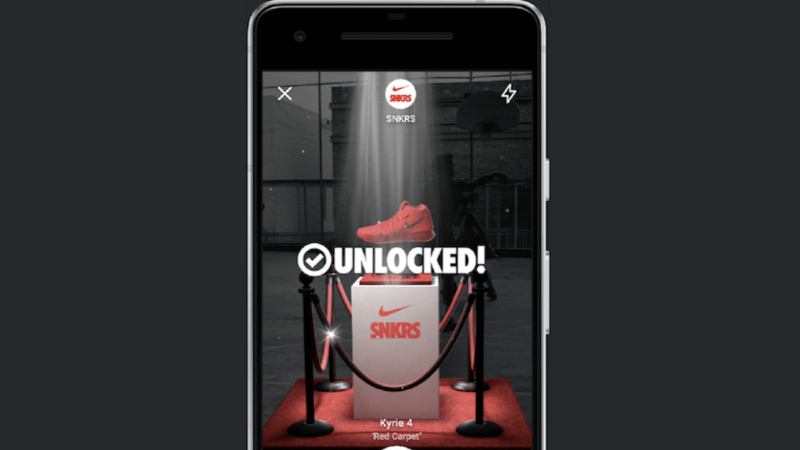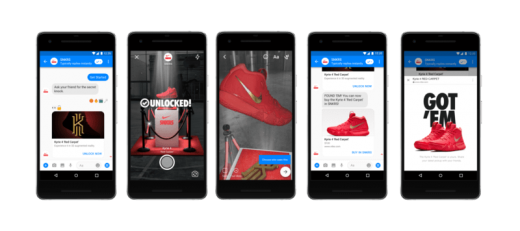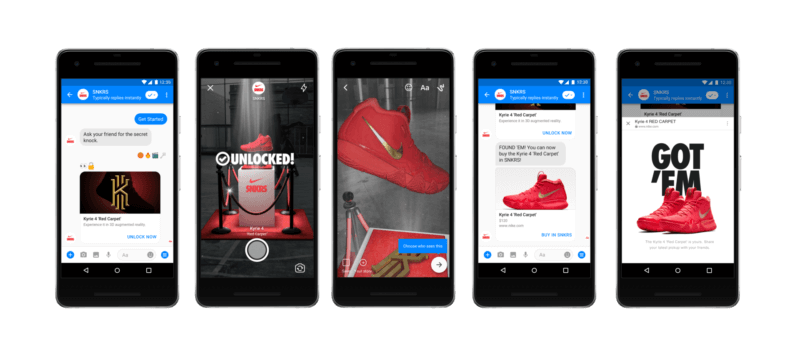Why Nike’s AR experiment for Facebook Messenger was a hit with its customers
As augmented reality goes from ‘wow’ to ROI, this sneaker event represents one of the first home runs.

At this year’s F8 conference earlier this month, Facebook announced that brands can now use its Camera Effects Platform to employ augmented reality (AR) with Messenger bots.
Four brands — Kia, Nike, Sephora and ASUS — participated in a closed beta to incorporate this added capability. Kia showed off its Stinger car, Sephora enabled virtual makeup and ASUS enabled a virtual “unboxing experience” for one of its phones.
But Nike’s experiment had one result that the other three — and few AR projects to date — have not yet duplicated.
It sold out. In an hour.
The Nike project and others were announced on the F8 stage, Messenger Product Manager Heath Black told me, and the featured Nike sneakers sold out within the next hour. (Nike has declined to reveal how many sneaker pairs were sold.)
But it wasn’t just a “go here” kind of AR experience. First, there was what Nike called “the secret knock.”
Sneaker fans had to obtain and line up a sequence of four emojis, which were distributed by Messenger-based social influencers working with Nike. Then, in a communication with Nike’s SNKRS bot, they entered these four as a code.
The “knock” revealed a link to a “Kyrie 4 ‘Red Carpet’” experience which, when clicked, opened the phone’s camera and allowed the user to see the sneakers atop a pedestal surrounded by red carpet. The Red Carpets are a limited edition shoe branded by basketball star Kyrie Irving.
The user could then examine the sneaker by walking around the pedestal, viewing its superimposition over a real environment through the camera screen.
When the user exited the experience, a screen offered the opportunity to purchase the shoes. And some number of sneaker fans did, immediately. Here’s a summary of the user flow:
While AR certainly has a “wow” factor going for it, that sizzle is probably going to wear off over time. So, the Nike test project might give some hints about what a successful AR-based sales event might look like, with ROI boosting the buzz generated by a good sizzle.
First, Black noted, AR over reality boosts a product because of “the idea that still images aren’t nearly as attractive as seeing [them] in the real world.”
Second, he said, Nike designed the experience so that it had several exclusive elements, including the “secret knock.” Black compared that to the special password required to get into speakeasies during Prohibition.
While sneaker exclusivity offers a different kind of intoxication, he noted that this approach meshes well with the attraction of limited editions to “sneakerheads.” For product aficionados, seeing something before anyone else does can be a strong incentive.
And the Nike effort, like the other three brands’, also probably benefited from the fact that it was AR within a social platform.
As VP of Messaging Products David Marcus noted in a Facebook Newsroom post:
“Blending AR effects and messaging solves a real problem for people shopping online. There are so many situations where we need to visualize a product before we feel comfortable buying it. We often seek input from our friends and family before making a purchase. This feature — launching in closed beta — leverages the nature of messaging to help people get valuable, instant feedback about purchases, customizations, and more, without ever needing to set foot in a store.”
It remains to be seen if there are other ways in which a well-designed AR experience leads to sales as well as oohs and aahs, but Nike’s pilot with Messenger AR points out one path.
Marketing Land – Internet Marketing News, Strategies & Tips
(49)




